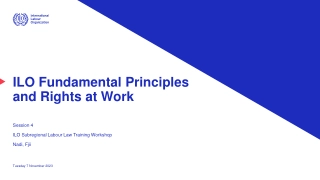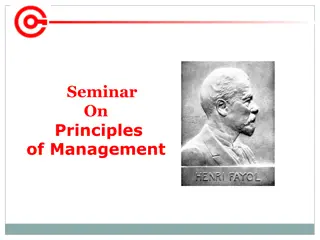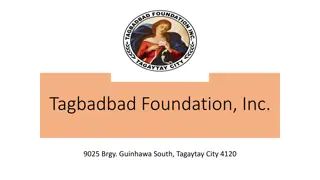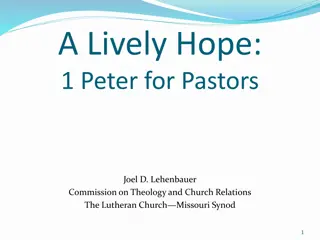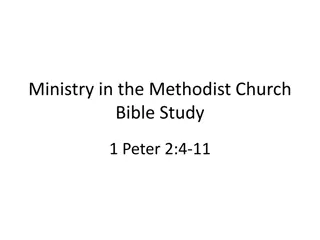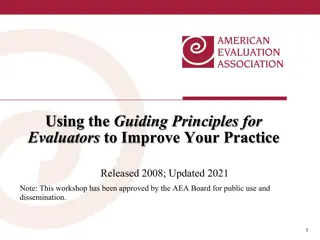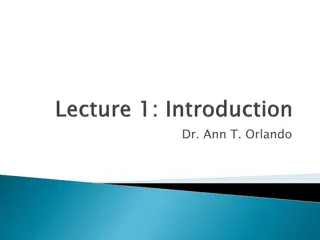ILO Fundamental Principles and Rights at Work
Explore the 5 fundamental principles and rights at work outlined by the ILO, emphasizing social justice and decent work. Delve into how these principles connect with ILO conventions and discuss challenges in their application to Pacific Island Countries.
0 views • 15 slides
Understanding Open Government Data Principles and Benefits
Open Government Data (OGD) principles and policies play a vital role in promoting transparency, citizen engagement, innovation, and data-driven decision-making in government operations. Governments worldwide are adopting open data policies to enhance accessibility, reusability, collaboration, privac
0 views • 36 slides
Principles of the Ghana Civil Service Code of Conduct
The Code of Conduct for the Ghana Civil Service, outlined by Elizabeth Obeng-Yeboah, emphasizes principles such as abiding by the constitution and laws with dignity, integrity, and professionalism. It sets standards for conduct, avoiding conflicts of interest, maintaining political neutrality, and u
1 views • 34 slides
InterManager's General Principles of Conduct and Action
InterManager, a prominent trade association in the shipping industry, has established General Principles of Conduct and Action to uphold ethical standards, promote safety, environmental protection, and continuous improvement. These principles guide members towards integrity, professionalism, and acc
2 views • 72 slides
Advocating Together for Academic Freedom - Importance and Principles
Advocating for academic freedom is crucial for the advancement of knowledge and quality education. The American Association of University Professors (AAUP) champions academic freedom, shared governance, and economic security for faculty members. The 1940 Joint AAUP/AAC&U Statement of Principles on A
4 views • 14 slides
Understanding the Core Principles of the 2030 Agenda for Sustainable Development
Explore the key features and principles of the 2030 Agenda for Sustainable Development with a focus on its core principles of Universality, Leaving No One Behind, Interconnectedness and Indivisibility, Inclusiveness, and Multi-stakeholder Partnerships. This comprehensive agenda encompasses 17 Sustai
4 views • 11 slides
Academic Freedom and Shared Governance in Higher Education
Academic Freedom and Shared Governance are foundational principles advocated by the American Association of University Professors (AAUP) to ensure educators have the freedom to explore, research, teach, and discuss without censorship. These principles empower educators to enhance student learning an
0 views • 9 slides
Essential Principles of Management Discussed in Seminar
Explore the foundational principles of management discussed in a seminar on principles of management. Delve into topics such as division of work, authority, discipline, unity of command, and unity of direction as outlined by Henri Fayol. Gain insights into the importance of these principles for effe
0 views • 22 slides
Baptist Beliefs and Practices Explained
Explore the core beliefs of Baptists, including their reliance on the Bible for faith, autonomy of local churches, priesthood of believers, two ordinances, individual soul liberty, and separation of church and state. Discover the unique perspectives that shape Baptist theology and practices.
0 views • 10 slides
International Law of War: Nuremberg Principles and Accountability
The Nuremberg Principles, derived from the trials of Nazi officials for war crimes, establish accountability in international law. These principles hold individuals responsible for committing acts considered crimes under international law, regardless of their position or orders received. The assumpt
2 views • 22 slides
Promoting Ethical Principles in Social Science Research
Explore the challenges and strategies for translating and applying ethical principles, especially in emergency contexts. Learn key questions in social science research and how to ensure information contributes to community actions. Understand the importance of considering ethical principles in all w
0 views • 21 slides
Tagbadbad Foundation, Inc.: Providing Renewal Programs for Church Leaders
Tagbadbad Foundation, Inc. is a non-profit religious organization focusing on providing quality and affordable renewal programs and trainings for bishops, priests, male/female religious, formands, and laity. Their offerings include developmental renewal programs like Training on Celibate Living, aim
0 views • 23 slides
How to Manage LDS Callings and Administer Site Effectively
Detailed guide on creating an account, logging in, site administration, managing people, setting permissions, utilizing the dashboard, and submitting calling or Priesthood ordination requests for LDS members. Complete step-by-step instructions with images provided for each process.
4 views • 27 slides
Study Guide for Principles of Management Course at Africa Research University (ARU)
Welcome to Africa Research University (ARU)! This study guide is designed to help you navigate through the Principles of Management course (Course Code: PRM4) at ARU. It provides an introduction to the course content, emphasizing the importance of developing management skills to effectively lead and
1 views • 40 slides
Key Principles of Insurance Explained with Visuals
Understanding the principles of insurance is crucial for both insurance seekers and companies. The principles include Utmost Good Faith, Insurable Interest, Indemnity, Contribution, and Subrogation. These principles ensure transparency, fairness, and protection for policyholders. Visual representati
0 views • 6 slides
The Wise Men and Their Gifts in the Christmas Story
The story of the Wise Men who traveled to worship the newborn King of the Jews, bringing gifts of gold, frankincense, and myrrh. These gifts symbolize Jesus' kingship, priesthood, and sacrificial death. Reflecting on their mission and the significance behind the gifts they presented, the Christmas n
0 views • 7 slides
Latvian Rituals, Temple, and Priesthood: A Spiritual Journey
Explore the rich tradition of Latvian rituals, temple structures, and the sacred priesthood. Discover the deep spiritual connection to divinity, the concept of divine perfection, and the significance of ritual spaces like temples and natural energetic places. Delve into the unique folk structure of
0 views • 20 slides
Principles of Training: Overload, Specificity, and Progression
Principles of training encompass overload, specificity, and progression. Overload requires doing more than usual, specificity involves tailored activities, and progression ensures gradual advancement. These principles are vital for improving fitness levels safely and effectively, emphasizing the nee
8 views • 17 slides
Perspectives on 1 Peter: A Lively Hope for Pastors and Churches
Explore profound insights from theologians and scholars on the significance of the book of 1 Peter in the New Testament. Delve into themes of chosen generation, royal priesthood, and peculiar people as highlighted in different perspectives, emphasizing the church's role in a changing world moving fr
0 views • 106 slides
Understanding the Importance of Apostles, Prophets, and Revelation in the Church
Apostles and prophets play essential roles in providing guidance and revelation in the Church, while priesthood authority is necessary for the proper functioning of God's work on earth. The Great Apostasy highlights the consequences of turning away from true doctrine and rejecting authorized servant
0 views • 26 slides
Reflections on The Church and God's People in 1 Peter Bible Study
Exploring themes of renewal, identity, and purpose in the Methodist Church Bible Study through passages from 1 Peter and Hosea. The study delves into the concept of being God's chosen people, the significance of Christ as the cornerstone, and the believers as living stones in a spiritual house. Thro
0 views • 12 slides
The Priestly Role of Samuel: A Template for Serving God
Samuel, a chosen man of God, exemplifies the priestly calling through his service and anointing of the first Kings of Israel. Born miraculously to Hannah, he belonged to the tribe of Levi and was dedicated to God's service from his youth. His life reflects the dual role of kingship and priesthood th
0 views • 16 slides
Effective Partnership and Mutual Accountability in Nutrition Clusters
The content discusses the minimum commitments needed for participation in Nutrition Clusters, explains the Principles of Partnership, and explores how these principles can enhance coordination and accountability to affected populations. It emphasizes partner commitments, such as leadership, mainstre
0 views • 7 slides
God's Story & God's People: A Call to Proclaim
Explore the narrative of God's mission and how His people are called to be a chosen race, a royal priesthood, and a holy nation, proclaiming His mighty acts. This collection reflects on the biblical story, the role of the Church, and the priestly mission entrusted to believers.
0 views • 16 slides
Understanding Jesus After the Order of Melchizedek in the Book of Hebrews
The Book of Hebrews focuses on Jesus as the ultimate High Priest in the order of Melchizedek, surpassing prophets, angels, Moses, and Aaron. It explores the significance of this new priesthood, emphasizing Jesus as the central figure of the Old Testament and the fulfillment of God's promise. The cha
0 views • 52 slides
Overview of Fundamental Principles of Space Law and Outer Space Treaties
The content discusses the fundamental principles of space law highlighted at the United Nations Space Law Conference 2020, focusing on key treaties such as the Outer Space Treaty of 1967 and associated rights, duties, and obligations of states in space exploration and use, including non-appropriatio
0 views • 16 slides
Knights of Columbus Minnesota Programs Overview
Explore the various programs offered by the Knights of Columbus in Minnesota, including Knightly Knowledge Check, financial support for seminarians through RSVP, and initiatives like Into the Breach to combat the crisis of religious faith. Learn how the organization supports men and women preparing
0 views • 27 slides
Overview of Directive Principles of State Policy in Indian Constitution
Directive Principles of State Policy (DPSP) in the Indian Constitution encompass social, economic, and political programs aimed at realizing ideals of justice, liberty, equality, and fraternity. They are non-justiciable but guide the state in legislative matters. Classified into Socialistic, Gandhia
0 views • 24 slides
Exploring the Superiority of Jesus' Sacrifice in Hebrews
Delve into the profound discussions in Hebrews regarding the superiority of Jesus' sacrifice over animal sacrifices, emphasizing the importance of drawing near to God, avoiding willful sin, and grasping the significance of Christ's priesthood and atonement.
0 views • 56 slides
The Character of Kings: Reflections on God's Guidance and Kingship
Exploring the themes of divine guidance, kingship, and the role of God in the history of Israel as depicted in Chronicles and Psalms, along with insights on the nature of leadership and priesthood. The concept of gifts and callings being irrevocable is discussed alongside the significance of God's r
0 views • 32 slides
Understanding FAIR Principles in Biomedical Research
The FAIR principles - Findable, Accessible, Interoperable, and Reusable - provide a framework for ensuring scientific data in biomedical research is managed and shared effectively. This informative session delves into the theory and practice of FAIR principles, emphasizing the importance of data qua
0 views • 28 slides
The FAIR Principles for Data Management and Stewardship
Embrace the FAIR principles - Findable, Accessible, Interoperable, Re-usable - for effective scientific data management and stewardship. Learn how annotations enhance data FAIRness and the key attributes of each principle. Dive into the high-level guiding principles that ensure data is globally uniq
0 views • 25 slides
The Greatness of Jesus: A Study on Hebrews 9 and Sacrifices
Exploring the superior position of Jesus in comparison to prophets, angels, Moses, and more as detailed in Hebrews 9. Delve into the significance of sacrifices in the Old Testament and their fulfillment in the New Testament, emphasizing Jesus' sacrifice and the symbolism of sacrificial practices. Di
0 views • 15 slides
Understanding the Guiding Principles for Evaluators
This content provides insights into the Guiding Principles for Evaluators, including their history, assumptions, and key principles such as Systematic Inquiry and Competence. The workshop aims to increase knowledge about ethical evaluation practices and stimulate discussions within the evaluation co
0 views • 22 slides
Guiding Principles for GETSI/INTEGRATE Webinar – Materials Development and Goals
The webinar presented by David Steer from the University of Akron focuses on guiding principles for material development in the context of GETSI/INTEGRATE modules. It outlines goals for the session, including discussing components of the guiding principles, examples of meeting those principles, and
0 views • 13 slides
Exploring the Meaning of Priesthood with Church Fathers
Delve into the understanding of priesthood by Church Fathers such as St. Augustine, focusing on texts like Psalm 132 (133). The course emphasizes class attendance, engaging discussions, and submission of bi-weekly papers to enhance comprehension. Explore the ancient meanings of 'priest' and sacrific
0 views • 36 slides
Understanding Henri Fayol's 14 Principles of Management
Henri Fayol, the Father of Modern Management, introduced 14 Principles of Management in 1916, outlining essential guidelines for effective management. These principles cover areas such as division of work, authority and responsibility, discipline, unity of command, and unity of direction. By followi
0 views • 19 slides
Principles of Management: Understanding Henri Fayol's 14 Key Principles
Explore the foundational principles of management through the lens of Henri Fayol's 14 key principles, which offer valuable insights into managerial decision-making and organizational interactions. Delve into the history of Henri Fayol, his contributions to management theory, the concept of authorit
0 views • 14 slides
Legal Principles of Insurance
The legal principles of insurance include indemnity, insurable interest, subrogation, and utmost good faith. These principles ensure fair compensation, financial risk protection, and honesty in insurance contracts. Understanding these principles is crucial for both insurers and policyholders to navi
0 views • 18 slides
Jesus Ordains His Twelve Apostles and Principles of Service
Jesus ordains His original 12 apostles, empowering them to serve in His name. The importance of losing oneself in service to others is highlighted as a key principle in serving the Lord. Additionally, the priesthood principles and miracles in Latter-day Priesthood are discussed, emphasizing the sacr
0 views • 12 slides
